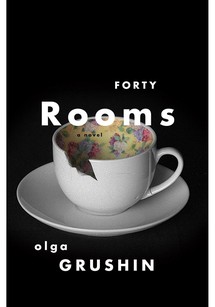For the initially unnamed protagonist of Forty Rooms, the sly and devastating third novel by Olga Grushin, the world is full of magic. As a child in Soviet Russia, in the company of a formidable mermaid, she examines her mother's jewelry, each piece a precious portal into the mysterious history of her family and her country. Later, she discusses banned poetry with a man who has the face of a "ruined god." On the eve of adulthood, she resolves not to choose a fate "of fulfilled expectations, of commonplaces and banalities, of children's sore throats...within four walls." Her dream is for immortality as a poet. But is she talented enough? Is she willing to make the required sacrifices?
In previous works, Grushin, a Russian-born American writer, has addressed themes of artistic struggle and the search for meaning within a totalitarian regime. Here, the focus is decidedly personal, relatable to anyone striving to live deeply.
We follow our protagonist to an American college and eventually to the suburbs, where she becomes Mrs. Caldwell and, soon, a mother of six. Along the way, the book's intimate first-person voice yields to a more distant observer. And as the houses Mrs. Caldwell occupies grow bigger, so does her uncertainty over her choices. She still tries to look "below the surface of ordinary things," but now that parallel reality is inhabited by judgmental ghosts—her mother and grandmother, past lovers, what could have been. Her old sidekick, the unkempt poetry muse, visits less often—or is it that she summons him less?
The novel gathers poignancy as Grushin shifts the perspectives through which Mrs. Caldwell assesses her accomplishments and failures. A way of being that seemed settled, satisfactory, is revealed to be lacking; a predictable existence appears bountiful; a fate once thought chaotic brims with freedom.
Full of original and quoted poems, this heartbreaking novel is an invitation to contemplate whether the richness and ambition of one's life has to correspond to the proportions of one's landscape. The corners of even the smallest rooms needn't be confining, but places where "forces of the universe [run] deeper," if one only knows how to look, how to feel.


